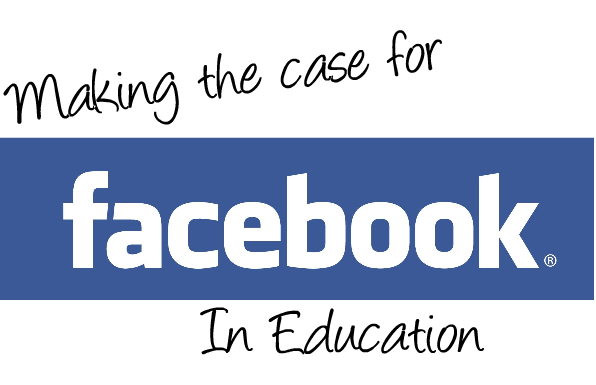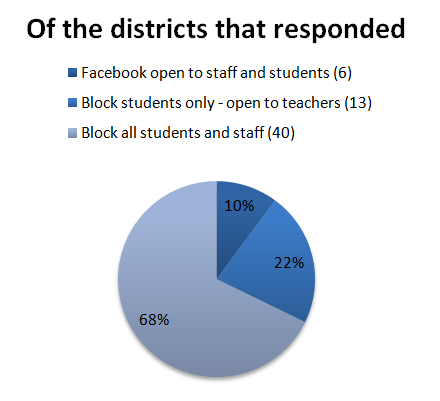DISCLAIMER – This post has links to content that is on Facebook. If you are reading this in a distinct who blocks Facebook you will not be able to view it without a filter bypass password!
 During the MN State 2010 Memo conference, a media specialist announced to the group of a couple of hundred participants… “Osseo Public Schools has an opening for a Media Specialist. We filter, but we do not block content in our district. Wiki’s, Blogs, Youtube and Facebook are open and available to our staff and students”.
During the MN State 2010 Memo conference, a media specialist announced to the group of a couple of hundred participants… “Osseo Public Schools has an opening for a Media Specialist. We filter, but we do not block content in our district. Wiki’s, Blogs, Youtube and Facebook are open and available to our staff and students”.
Youtube was open in my district only a year ago. Opening it up quickly moved Youtube from a “distraction” to innovation… and finally to a trans-formative classroom tool in less than 1 years time. Not only does it provide endless “just in time” video tutorials, curriculum support, it also has been used to showcase our students work. However, the transformation came when Math teachers decided to start posting SMART board lecture to it and use it as an integral part of their eCurriculum. (The Math department has decided to discontinue the use of expensive and antiquated textbooks and put all of their content online – but that is for another blog post!) Now, through the use of Moodle, Youtube, and other tools – students have access to learning resources 24/7. The cost for this tool = $0. The cost to support this tool = $0. The value of this tool in teaching, learning (including mlearning) = priceless!
Facebook, on the other hand, is blocked for students and staff in my district. In my own personal use of the tool, I am now recognizing that work and personal information are blurring. I subscribe to many educational Fan Pages, Groups, and have had some fantastic discussions with folks all over the world via Facebook! The comment by the Osseo media specialist resonated with me so much, that I decided I had to do something to start a conversation in my own district to consider opening Facebook to staff and students. If I were an innovative and talented teacher, who had a couple of job offers on the table:
- District A: Great school district, great community, great kids, BLOCKS social media tools like Youtube, Twitter, and Facebook from staff and students.
- District B: Great school district, great community, great kids, social media is OPEN to staff and students and teachers are encouraged to find educational use of the tool that all kids are using anyway.
Which one I would choose? To me its easy. Sure, there may be those who would much prefer District A – but for district leaders – who do you want in your talent pool?
And so my journey began. The following presentation, Making the case for Facebook in education, has been shared (f2f) with district leaders as well as our district technology committee.
While presenting, I spoke of the Osseo’s, the Mankato’s, and the District 287’s. All MN districts that I consider tech savvy, innovative, and have always been on the cutting edge in teaching and learning practices. (I also realize there are MORE MN schools than my short list!) At the request of my admin team, I developed a Google Form to find out if other schools block/don’t block Facebook and why. The form was dispersed to MEMO’s distribution list as well as other regional lists with the following questions:
Does your district currently block Facebook?
- Yes – it is blocked for staff and students
- Yes – it is blocked for students only
- No – Facebook is OPEN for all students and staff
What is your district’s rationale for this decision?
I was very happy with the response. We had 67 people respond to the survey representing 59 MN districts. I decided to summarize the above questions and include the RATIONALE given by districts. View the full summary here (Google Doc).
My (UNOFFICIAL) analysis of the district’s rationale to block Facebook included these top 3 reasons:
- Safety/Content/CIPA
- No Educational Value
- Time Management/Distraction
My response to the top 3 reasons why MN schools block Facebook
Safety/Content/CIPA – In a district that blocks Facebook – most likely the only time those offices deal with Facebook is in the cases where there are discipline issues and cyberbulling. Because of this, It is hard for schools to recognize the value of something when a few of our students are not using the tool correctly. But when/where are we educating our kids on the proper use of these social tools? Many of our parents do not understand the technology nor the repercussions of posting inappropriate things on profiles. I truly feel it is our responsibility, as educational institutions, to be educating our students (as well as staff and communities) on the proper use of today’s social media – and first on the list should be Facebook. Why do we wait to have a Facebook discussion when the kid is in our office and in trouble?
As for CIPA, that is not a valid excuse. Please take note – CIPA only requires that schools (who apply for erate funds for Internet) block sites that are: obscene, child pornography, or harmful to minors (for computers that are accessed by minors). If Facebook were “harmful” to minors do you think President Obama or even the MN Department of Education would have a Facebook Fan page?
No Educational Value – There is educational value with Facebook. We all need to do our homework. Besides what you already know or what you have learned from this post – here are other resources you can use to get the conversation started:
- The Innovative Educator – 10 Ways Facebook Strengthens the Student – Teacher Connection and Facebook Doesn’t Get Teachers Fired – Inappropriate Behavior Does
- Blue Skunk Blog – Facebook – an educational resource?
- The Official Facebook Safety Center
- Facebook’s Education Fan Page – <—– LIKE it and learn from it!
After doing your own investigations…. Start following educational entities and learn how they are using Facebook to share information as well as receive input from stakeholders. Share what you learn/know with district leaders and staff. You should be having the same conversation in your district as we are in ours.
Time Management/Distraction – I realize that Facebook can be distracting to students and teachers. I realize that time management is always a concern and students and staff should be taught to use Facebook appropriately. If the rules are not followed, then we need policies to be put in place to address those issues. BUT, I also know that Facebook is distracting my personal time with learning. Excellent learning opportunities continue to occur for me while surfing my Facebook family and friends status updates. The potential for informal or incidental learning is tremendous and we need to figure out how we can tap into this!
I would like to complete my thoughts and say that if we continue to block Facebook in our district’s, especially for our teachers and staff, we may never realize the educational value Facebook has. As of today, my district is still blocking Facebook. But we are having the conversation! According to my results from a little survey of MN schools we are part of the NORM. Is this NORMAL good enough?

Great post Jen. Changes in my district; hopefully I’m able to start the conversation. Thank you for the resources.
Ted – SW Ohio
Thanks for the post Jen. I forwarded it to my district tech team. You talk about things I hadn’t thought about in the social media arguments. Thanks again! Kathy
Wow Jen. I am using this as training material where I train teachers to use Read/Write Web in classrooms
Hello all,
Don’t know if you have all heard about that story of Sameer Bhatia who, through social networking, in only 11 weeks, was able to get over 150,000 people to consider a bone marrow transplant, to convince 24,000 to actually get tested, and then was able to find a bone marrow match for himself, just the one though. A year later, in 2009 the network that he left behind matched over 266 donours, a phenomenal number. Surely a powerful tool that our students might benefit from using in a more professional and positive context than locked away at home…
Cheers
ANdrew